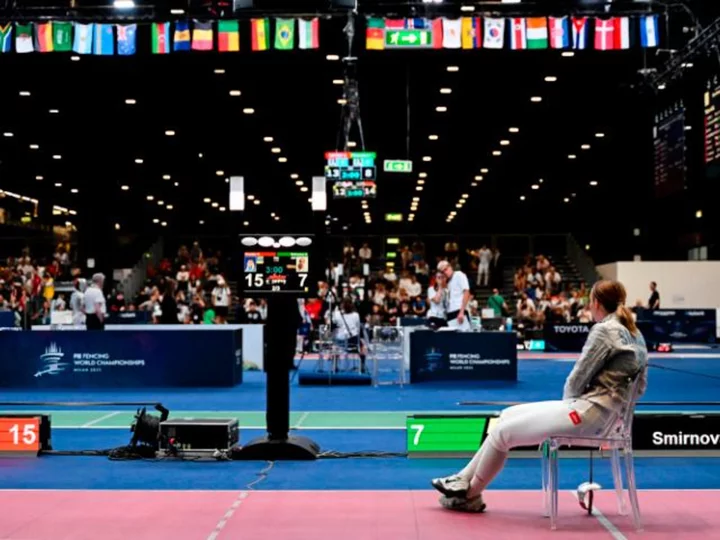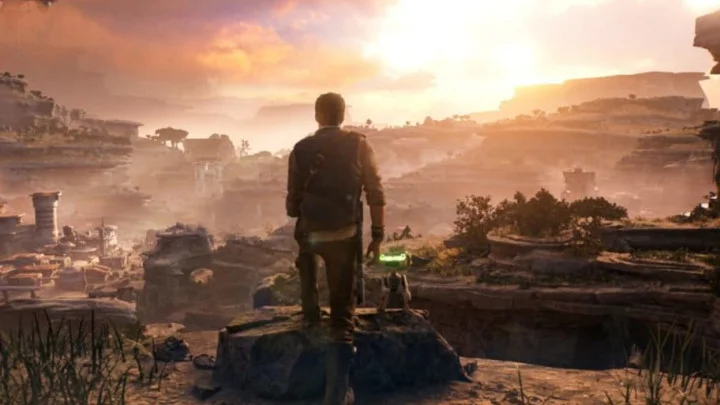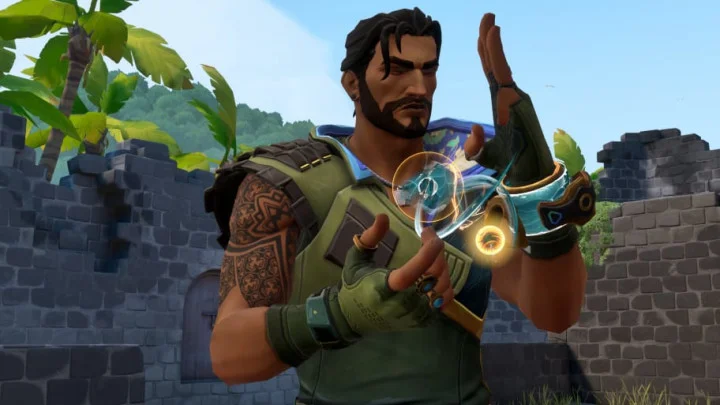A day after Paris marked a year to go until the 2024 Olympics, Ukrainian fencer Olga Kharlan was disqualified from participating in the world championships after she refused to shake hands with Russian Anna Smirnova.
Kharlan's disqualification threw into sharp relief the political and organizational jeopardy that France and the International Olympic Committee (IOC) is facing ahead of the Games.
Russia's ongoing invasion in Ukraine has provided decision makers with major challenges, notably the key question of Russian and Belarusian athlete participation.
Meanwhile, riots, pension strikes, and complaints over "exorbitant" ticket prices in France itself threaten to derail public sentiment relating to the Olympics, set to take place 100 years after the capital last hosted the quadrennial event.
Russian controversy
The IOC has faced criticism for its stance on Russian and Belarusian athletes competing at the Olympics, while president Thomas Bach lamented Ukraine and Russia's "diametrically opposed" views on neutral athletes' participation in a speech in June.
In recent summer and winter Games, athletes from Russia have been permitted to take part under a neutral flag of the Russian and Belarusian Olympic Committees -- with gold medalists from the nations not hearing the official national anthems on the podium.
Indeed, Smirnova was competing at the world championships in Milan as a neutral individual with official Russian participation in such tournaments outlawed.
In March, the IOC announced a widely condemned recommended pathway to allow Russian and Belarusian athletes to participate in international competitions despite the ongoing invasion of Ukraine.
So far, no decision has been taken on Russian and Belarusian athletes' participation at the 2024 Paris Olympics.
"Despite offering a workable pathway forward with our values-based recommendations, we are still confronted with two irreconcilable positions," Bach said during the remote IOC session.
"The Russian side wants us to ignore the war. The Ukrainian side wants us to totally isolate anyone with a Russian and Belarusian passport. Either position is diametrically opposed to our mission and the Olympic Charter."
Edwin Moses and Nawal El Moutawakel, two Olympic gold medalists affected by the 1980 Moscow Olympic boycott, both expressed concern over the idea of a total ban of athletes from a nation when recently speaking to CNN's Amanda Davies.
On that occasion, the US Olympic team, urged by US President Jimmy Carter and his administration, sat out the event following the Soviet invasion of Afghanistan in December 1979. Morocco was one of the 64 nations which joined the USA in refusing to compete, according to the US State Department.
"I was very much against the United States boycotting the Soviet Union for obviously personal and athletic reasons," said Moses, the gold medal winner in the men's 400-meter hurdles in 1976 and 1984.
"I really wanted to go to the Olympics after winning the first time. But then as you get a little bit older, you kind of reevaluate. And if athletes decide that what's happening in Ukraine is very wrong, which I think it absolutely is, it's up to them to decide whether they want to compete or not."
El Moutawakel, who won gold for Morocco in the 1984 women's 400-meter hurdles, said she felt "really sad" to miss the Games via the boycott. "You train for so many years -- some four years, some 10 years -- for that big rendezvous and all of a sudden, everything just collapses," she added.
"So my dream and our dream is to see all these athletes coming in all together in total friendship and solidarity and in a peaceful way in the Games in 2024 Paris."
The Soviets responded by boycotting the subsequent Olympics in Los Angeles, California, in 1984, along with 14 other Eastern Bloc nations.
Unrest and uncertainty
Arrangements for next year's Olympics, which is set to attract 9.7 million spectators, according to organizers, have been far from smooth in the French capital -- though President Emmanuel Macron insisted on Wednesday that the country "will be ready."
"A year out, we still have a lot of work to do, for the welcome, for hotels, transport, security, ticketing, but the whole world will be there and we will be ready. That's my message," he said.
In June, French police raided the offices of the Paris 2024 organizing committee, while the city and indeed country was gripped by civil unrest following the fatal shooting of a 17-year-old by police. Those riots came just weeks after hugely disruptive protests and strikes over pension reforms in France finally died down.
Tony Estanguet, President of Paris 2024 and a three-time gold medalist in canoeing, told CNN's Melissa Bell that he is confident the investigations into allegations of misuse of public money and favoritism by the committee will come to nothing.
"It's just a control step and we will see what will be the next phase," he said. "But at the time we speak now today, there's no evidence of any wrongdoing."
For many in the country, hosting the Olympics will evoke memories of the FIFA World Cup in 1998. That was sold as not only a sporting festival but as a regeneration opportunity for Paris and France's underrepresented areas -- with the Stade de France in Saint-Denis the centerpiece of that rejuvenation.
However, events such as the 2022 UEFA Champions League final -- which took place in the Stade de France -- cast doubt on that notion, as well as the competency of the Parisian Préfecture de Police. An independent panel described the final as a "near-miss: a term when an event almost turns into a mass fatality catastrophe."
While organizers and the French government claim that this will be the most inclusive Games yet, a growing chorus of voices aren't convinced.
Accessibility is a main concern, both financially due to the eye-watering cost of tickets, and for disabled people who worry about navigating Paris' decades-old transport infrastructure.
One French 5,000-meter runner, Jimmy Gressier, said on social media that inviting 10 relatives to see him compete would cost between 6,000 and 7,000 euros ($6,400 to $7,500), according to CNN affiliate BFMTV.
He said the ticketing was "really exorbitant," especially for what "is fundamentally an affordable sport for all and accessible, and there aren't great stars."
"I understand, I'm sorry they're disappointed," organizing chief Estanguet told CNN affiliate BFMTV-RMC Sport in March.
"We know there's much more demand than supply," added Estanguet, referring to ticket demand.
Legacy
From a sporting perspective, Paris 2024 will see a number of Olympic legends looking to cement their legacies -- perhaps none more so than Jamaican sprinter Shelly-Ann Fraser-Pryce.
The 36-year-old, who is set to compete at her fifth Games, is hoping to add to her tally of four gold medals and eight overall.
She is also looking to further demonstrate that motherhood is no barrier to success.
"I don't think we have enough examples or, seeing it enough, where women get the opportunity to decide, 'What do I want to do with my future' -- if I want to start a family or I want to continue (racing)," Fraser-Pryce recently told CNN Sport.
"Because so many times there is this stigma that's attached to us as women. Funnily enough, I had my son after the 100-meter finals (at the 2017 World Athletics Championships) -- and I remember sitting down at home watching it and I was almost in tears because I wanted to be there."
American swimming sensation Katie Ledecky will also be hoping to further her Olympic lore.
Having already claimed seven golds in the pool and a women's record of 20 World Aquatics Championship golds, Paris represents a chance for the 26-year-old to establish herself as the dominant female swimmer of her era -- with the younger Ariarne Titmus (Australia) and Summer McIntosh (Canada) set to challenge.
Core message of unity
Despite the disruptions, organizing chief Estanguet has a clear idea of what he wants the Olympics in Paris to represent.
"The main power of the Games is to provide emotion, and we strongly need, after Covid, after the war, after all this social tension, just to share a positive moment altogether and demonstrate what France is able to deliver to the world," he told CNN.
The opening ceremony is already uniquely French in nature with the Games set to be centered around the Seine, the river running through the city.
As opposed to previous Olympics, where the ceremony has taken place in a stadium, teams will form a procession of boats cruising down the river. Organizers believe 600,000 spectators will be able to watch the flotilla from the banks of the famous Gallic waterway.
Organizers also say that the Paris Games "finance themselves," claiming that 96% of the budget comes from private investment. The publicly funded 4% not included in that figure is to finance the Paralympic Games, according to the committee.
Next year's Olympic Games are set to start on July 26 and run until August 11. The Paralympic Games will then take place from August 28 until September 8.









